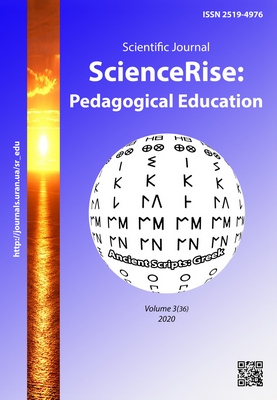Criteria, indicators and levels of the readiness of teachers of natural specialties to develop the entrepreneurship competence of high school students
DOI:
https://doi.org/10.15587/2519-4984.2020.202135Keywords:
postgraduate pedagogical education, readiness, criteria, indicators, levels of readiness, entrepreneurial competenceAbstract
The article determines the relevance of forming the readiness of teachers of natural specialties to develop entrepreneurial competence in the system of postgraduate pedagogical education, which ensures the improvement of education and vocational training of teachers by deepening, expanding and updating their professional knowledge, abilities and skills in accordance with current needs and education. Theoretical views of scientists to the definition of key concepts: "entrepreneurial competence", "readiness", "criteria", "indicators", "levels of readiness" are analyzed.
By combining problem-oriented, system-generalizing methods and method of system-structural analysis of scientific literature, the author has achieved the goal and the criteria for determining the readiness of teachers of natural specialties for the development of the entrepreneurial competence of high school students, formed in the system of postgraduate pedagogical, technological, educational, personality-emotional, behavioral ones. Within the selected criteria, appropriate indicators are defined, which characterize them and the methods and means of diagnosis are defined for each criterion: conversation, observation, questioning, analysis, report, self-report, expert evaluation and introspection. The developed system of criteria and indicators makes it possible to determine the levels of readiness of teachers of natural specialties for the development of the entrepreneurial competence of high school students: low (reproductive), medium (reproductive-reconstructive), sufficient (reconstructive) and high (creative).
The analyzed criteria, indicators and levels will allow to determine the realities and to predict the dynamics of forming the readiness of teachers of natural specialties to develop the entrepreneurial competence of high school students in the system of postgraduate pedagogical education.References
- Recommendation of the European Parliament and of the Counsil of 18 December 2006 on key competences for lifelong learning (2006/962/EC) (2006). Official Journal of the European Union. 2006. Vol. 394. P. 10–18. Available at: https://eur-lex.europa.eu/LexUriServ/LexUriServ.do?uri=OJ:L:2006:394:0010:0018:en:PDF
- EC presents new Rethinking Education strategy (2012). Available at: http://europa.eu/rapid/press-release_IP-12-1233_en.htm?locale=en
- Pro osvitu (2017). Zakon Ukrainy No. 2145-VIII. 05.09.2017. Available at: https://zakon.rada.gov.ua/laws/show/2145-19
- Nova ukrainska shkola: kontseptualni zasady reformuvannia serednoi shkoly (2016). Lviv, 40.
- Ziaziun, I. A. (2012). Filosofiia pedahohichnoho svitohliadu. Profesiina osvita: pedahohika i psykholohiia. Ukrainsko-polskyi zhurnal, 6, 209–222.
- Maksymenko, S. D. (2018). Mekhanizmy rozvytku osobystosti. Problemy suchasnoi psykholohii, 40, 7–23. Available at: http://nbuv.gov.ua/UJRN/Pspl_2018_40_3.
- Kremen, V. H. (2015). Problemy yakosti ukrainskoi osvity v konteksti suchasnykh tsyvilizatsiinykh zmin. Ukrainskyi pedahohichnyi zhurnal, 1, 8–15.
- Pometun, O. I. (2007). Interaktyvni metodyky ta systema navchannia. Kyiv: Shkilnyi svit, 112.
- Yesina, O. H. (2012). Kryterii otsinky yakosti pidhotovky suchasnykh fakhivtsiv. Teoriia ta metodyka navchannia fundamentalnykh dystsyplin u vyshchii shkoli, VII, 84–90.
- Kalko, A., Shykula, R. (2016). Vykorystannia naukovykh doslidzhen pro muzeinu pedahohiku ХІХ–ХХ st. u pidhotovtsi vchyteliv pryrodnychoho tsyklu. Kliuchovi kompetentnosti v modeli suchasnoho fakhivtsia: proceedings. Cherkasy, 256–261.
- Zavydivska, O. I.( 2018). Hotovnist do stvorennia zdoroviaoriientovanoho seredovyshcha orhanizatsii yak osoblyva katehoriia profesiinoi osvity maibutnikh menedzheriv. Psykholohopedahohichni nauky, 3, 168–174. Available at: http://lib.ndu.edu.ua/dspace/bitstream/123456789/935/1/28.pdf
- Honcharenko, S. U. (2011). Ukrainskyi pedahohichnyi entsyklopedychnyi slovnyk. Rivne: Volynski oberehy, 552.
- Busel, V. T. (2005). Velykyi tlumachnyi slovnyk suchasnoi ukrainskoi movy. Kyiv; Irpin: VTF «Perun», 1728.
Downloads
Published
How to Cite
Issue
Section
License
Copyright (c) 2020 Natalia Kurish

This work is licensed under a Creative Commons Attribution 4.0 International License.
Our journal abides by the Creative Commons CC BY copyright rights and permissions for open access journals.
Authors, who are published in this journal, agree to the following conditions:
1. The authors reserve the right to authorship of the work and pass the first publication right of this work to the journal under the terms of a Creative Commons CC BY, which allows others to freely distribute the published research with the obligatory reference to the authors of the original work and the first publication of the work in this journal.
2. The authors have the right to conclude separate supplement agreements that relate to non-exclusive work distribution in the form in which it has been published by the journal (for example, to upload the work to the online storage of the journal or publish it as part of a monograph), provided that the reference to the first publication of the work in this journal is included.







